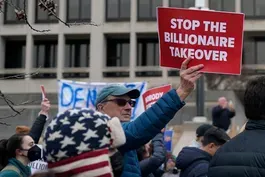
Resignation offer creates confusion for federal workers
Clip: 2/5/2025 | 9m 39sVideo has Closed Captions
Trump’s mass resignation offer creates widespread confusion for federal workers
More than two million civilian federal workers across the country are facing a deadline. They can either accept an offer from the Trump administration to resign and keep pay and benefits through September, or they can pass on the offer and take a gamble that they may be laid off soon. Lisa Desjardins reports on the latest and discusses the legality of the offer with attorney Michelle Bercovici.
Major corporate funding for the PBS News Hour is provided by BDO, BNSF, Consumer Cellular, American Cruise Lines, and Raymond James. Funding for the PBS NewsHour Weekend is provided by...

Resignation offer creates confusion for federal workers
Clip: 2/5/2025 | 9m 39sVideo has Closed Captions
More than two million civilian federal workers across the country are facing a deadline. They can either accept an offer from the Trump administration to resign and keep pay and benefits through September, or they can pass on the offer and take a gamble that they may be laid off soon. Lisa Desjardins reports on the latest and discusses the legality of the offer with attorney Michelle Bercovici.
How to Watch PBS News Hour
PBS News Hour is available to stream on pbs.org and the free PBS App, available on iPhone, Apple TV, Android TV, Android smartphones, Amazon Fire TV, Amazon Fire Tablet, Roku, Samsung Smart TV, and Vizio.
Providing Support for PBS.org
Learn Moreabout PBS online sponsorshipAMNA NAWAZ: More than two million civilian federal workers across the country are facing a gut-wrenching deadline tomorrow.
They can either accept an offer from the Trump administration to resign and keep their pay and benefits through September, or they can pass on the offer, but take a gamble that they may be laid off in the weeks ahead.
It's part of Elon Musk's push to dramatically cut the size of government that includes intelligence agencies like the CIA and the NSA, who are looking at the same offer.
Lisa Desjardins and our team have been talking with workers throughout the government, and she joins me now.
So Lisa, there's been a blitz of directives and actions around federal workers.
Help us understand what's happening and why it matters.
LISA DESJARDINS: Presidents have the right, as we just heard, to change agencies and to affect political appointees.
But what's happening here is sort of an unprecedented barrage of activity against the largest civilian work force in this country, pressure tactics, people told to snitch on their co-workers.
Let's take a look at through all the orders that federal workers have received in the last bit.
First, there is a hiring freeze in place across government.
They have this deferred resignation deadline that you talked about for tomorrow.
There have been administrative leave notices, layoffs in places.
There's been lists of new requirements that people think are going toward a purge.
Their back-to-office policy starts beginning Friday at the Department of Defense.
Now, as you said, Trump wants to downsize government.
But what's happening here is something even bigger, a bigger message, which is, it doesn't matter what your skill set is.
We're not looking at your job.
We simply want you to resign, whoever you are.
So what's happening for workers is, they're thinking if I could be fired.
Do I need to return to the office?
There is a debate over returning to office, of course, that can be had.
But our producer Diane Lincoln Estes worked out -- spoke to some federal workers who are dealing with this issue.
One of them she talked to in Texas explained that this difficult decision puts her family in a tough spot.
KATE, Federal Worker: I cried, sobbed in my car.
It's just a lot.
It's a lot to lose.
So there is no good option.
We're going to be commuting two hours a day no matter what we do.
So I just -- I don't - - the thing that gets me is, why?
Why?
Stop lying.
It's not efficiency.
They're going to have to lease out buildings and reconfigure desks and spend God only knows how much money to make space for all of us.
LISA DESJARDINS: So, you see, it's very personal.
I also talked to contractors who have already lost their insurance from being fired.
AMNA NAWAZ: That back-to-office order, what do we know about that and how it would actually work?
LISA DESJARDINS: It's agency by agency when it takes effect.
And also some of the details are still not clear to everybody.
Unions are saying this violates their bargaining agreements.
But the Office of Personnel Management sent out a directive saying, you can just ignore those union deals so far.
There is also a question about, is there actually room for all of these workers?
Diane spoke to someone else, Miranda Wolfcutter (ph) in Kansas, who's concerned about that.
MIRANDA, Federal Worker: My agency specifically just did a major reorganization that we just finished over the summer, and we sent every employee out of an office.
So we are all now remote, and we will all be called back to offices that no longer exist.
We gave up all physical space.
So in order to bring people back into an office, we first have to find those offices.
LISA DESJARDINS: Now, I also learned yesterday from a source that the Government Services Agency is now put out a directive saying it wants to sell or get rid of 50 percent of federally owned space.
Currently, that is 8,000 buildings across 2,000 communities, so really significant decision we haven't heard much about.
AMNA NAWAZ: In this moment, as you're talking to federal workers, what are they telling you about how they're navigating these decisions?
LISA DESJARDINS: I cannot overstress the kind of fear and chill effect hovering over federal workers at this moment, in addition to all of these dark-of-night decisions.
Workers have been told not to speak about this.
There are gag orders hanging over them.
Some of them are talking in code over encrypted apps.
Now, Elon Musk tweeted out -- or posted on X last night, rather.
He said this: "Leakers, if there is doubt, they're out."
I asked House Speaker Mike Johnson, what about freedom of speech?
He said, oh, no, I'm sure he didn't mean anything by that.
But federal workers take Musk's word seriously.
They believe there is a real threat to them.
And this is why several federal workers we talked to would not go on camera.
But here's what they said off camera.
WOMAN: If people know who I am and I'm sharing information, that it could be detrimental to me.
MAN: They're looking to root out any vestiges of any type of opposition.
WOMAN: They're looking for any reason to eliminate federal positions.
And I don't want to give an excuse to eliminate a federal position.
LISA DESJARDINS: Workers are finding strength in one thing, their oath of office to protect the Constitution.
AMNA NAWAZ: What do we know about the legality of all this, Lisa?
LISA DESJARDINS: Yes, I spoke just a short time ago with an expert on this, attorney Michelle Bercovici at Alden Law Group.
She represents federal workers.
Michelle, thank you for joining us.
MICHELLE BERCOVICI, Alden Law Group: Thank you for having me.
LISA DESJARDINS: I'm wondering, how overall are federal workers taking this in?
Do they think they have legal recourse?
And how -- what is your experience with what's going on here in the work force?
MICHELLE BERCOVICI: I will talk about it a couple of ways.
First of all, I do want to say this is unprecedented.
In the federal government, usually, when there's work force restructuring or major changes, it's a very deliberate process.
The government does a lot of really, really important things that make this nation function and make it function well.
So if you're going to be doing a buyout or retirement program, the agency is doing studies, they're realigning functions.
They're making sure their essentials are there to get the job done.
Bureaucracy does not move at lightning speed, but sometimes there's a reason for that.
So this bolt out of the blue, saying -- this resignation program is disorienting to begin with.
It's unprecedented to be communicating directly with OPM and not with your agency and to be in a situation where you're an employee and you expect maybe your supervisor or your manager's going to have answers about what's going on or certainly the chief human capital officer will have answers about what's going on.
LISA DESJARDINS: Are you sensing anger, fear?
What are you getting from these workers?
MICHELLE BERCOVICI: Yes, so federal employees believe in the government, in their mission, and they're all of a sudden hearing that they're lazy, unproductive, underperforming.
That's very hard to hear, because, quite frankly, they're some of the hardest working people I know.
And they don't know who to trust anymore because answers change so quickly every day.
You're used to having a place where you can at least get some firm information, some data, some evidence-based decision-making.
That is not the case here.
And at the same time they're being presented with these very vague choices, there's threats to their livelihood coming from all sides.
LISA DESJARDINS: In a nutshell, for a layperson, why might this not be legal?
MICHELLE BERCOVICI: I think it comes down to the fact that it's not clearly legal.
There are not clearly appropriated funds.
There's not clear authority pursuant to regulation or longstanding guidance.
And there's no precedent.
Because it's a federal government, if you're going to appropriate funds, if you're going to make certain changes, usually, there has to be some sort of regulation, congressional authorization, or one would hope, like, very thought-out guidance.
And, here, things like, for example, this idea that you can work -- get a second job while still getting paid by the government, that is very questionable.
It's only in very narrow circumstances.
There are a lot of rules and regulations that limit that, and limit that for a reason.
LISA DESJARDINS: So your advice to workers who have a deadline here, especially on the resignation offer, what should they do?
MICHELLE BERCOVICI: That is -- I mean, everybody at the end of the day, you have to make whatever decision is best for you and your family.
What I advise people is to not make that decision until you have done a benefits checkup, until you understand what specifically you are putting at risk if you take the offer and the agency reneges or changes its mind, because you will not be able to withdraw that resignation.
So I think, if you are in a place where, let's say, the offer doesn't work out and you are -- have to leave the government soon anyways, regardless, then perhaps you're not out of pocket much.
But if you're in a place where you need that job and you need those benefits, you have to be very careful, because it's just so unclear.
LISA DESJARDINS: Can I ask you one thing overall?
What do you think the purpose is of all this?
MICHELLE BERCOVICI: I think the purpose is to get folks to leave the government.
I don't think there's much care as to whether or not it's going to -- the government is going to be able to deliver on that process.
I think it's an end run around reduction in force.
And I think it's a way to, to be honest, intimidate the federal work force and kind of -- it's a chilling effect.
It's performative.
It's a pressure attack that gets coercive, in my mind.
I think they're -- the government -- or -- pardon me -- I think OPM is perhaps trying to give information to suggest it's not coercive.
But every time we get new information, it raises more questions.
LISA DESJARDINS: Unprecedented.
Michelle Bercovici, thank you much for talking to us.
MICHELLE BERCOVICI: Thank you.
Alton Brown brings humor to the page in 'Food for Thought'
Video has Closed Captions
Alton Brown brings his humor to the page in book of essays, 'Food for Thought' (9m 1s)
Former USAID administrator on global impact of dismantling
Video has Closed Captions
Former USAID administrator describes global impact of agency's 'destruction' (8m 2s)
Mideast leaders reject Trump idea to take control of Gaza
Video has Closed Captions
Middle East leaders condemn Trump's idea to remove Palestinians and take control of Gaza (10m 42s)
News Wrap: Swedish police trying to find gunman's motive
Video has Closed Captions
News Wrap: Swedish authorities trying to find motive of gunman who killed 10 (4m 45s)
Protests erupt as Elon Musk moves to gut government agencies
Video has Closed Captions
Protests erupt as Elon Musk moves to gut government agencies (6m 47s)
Trump signs order banning trans athletes from women's sports
Video has Closed Captions
Trump signs order banning trans athletes from competing in women's sports (2m 23s)
Providing Support for PBS.org
Learn Moreabout PBS online sponsorshipMajor corporate funding for the PBS News Hour is provided by BDO, BNSF, Consumer Cellular, American Cruise Lines, and Raymond James. Funding for the PBS NewsHour Weekend is provided by...


















